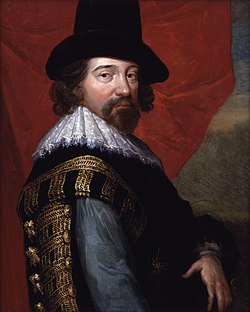This article possibly contains original research. (October 2010) |

The Baconian theory of Shakespearean authorship contends that Sir Francis Bacon, philosopher, essayist and scientist, wrote the plays that are publicly attributed to William Shakespeare. Various explanations are offered for this alleged subterfuge, most commonly that Bacon's rise to high office might have been hindered if it became known that he wrote plays for the public stage. The plays are credited to Shakespeare, who, supporters of the theory claim, was merely a front to shield the identity of Bacon. All but a few academic Shakespeare scholars reject the arguments for Bacon authorship, as well as those for all other alternative authors.
The theory was first put forth in the mid-nineteenth century, based on perceived correspondences between the philosophical ideas found in Bacon’s writings and the works of Shakespeare. Legal and autobiographical allusions and cryptographic ciphers and codes were later found in the plays and poems to buttress the theory. The Baconian theory gained popularity and attention in the late nineteenth and early twentieth century. The academic consensus is that Shakespeare wrote the works bearing his name. Supporters of Bacon continue to argue for his candidacy through organisations, books, newsletters, and websites.